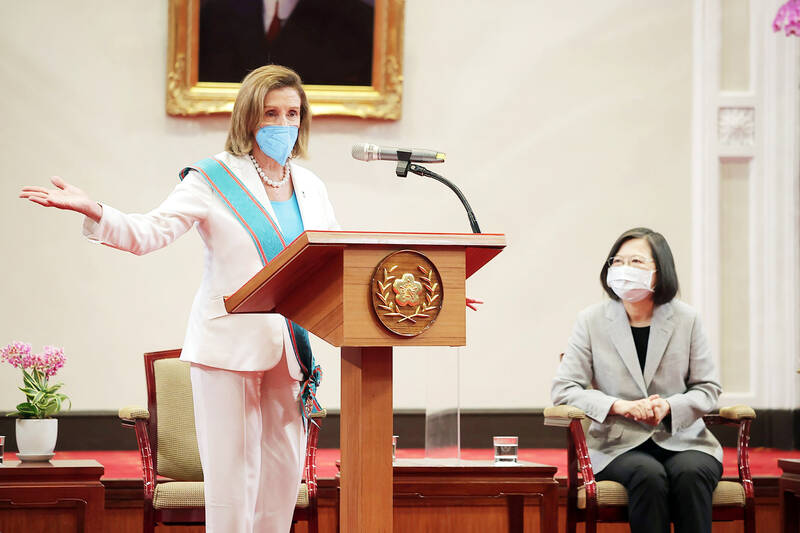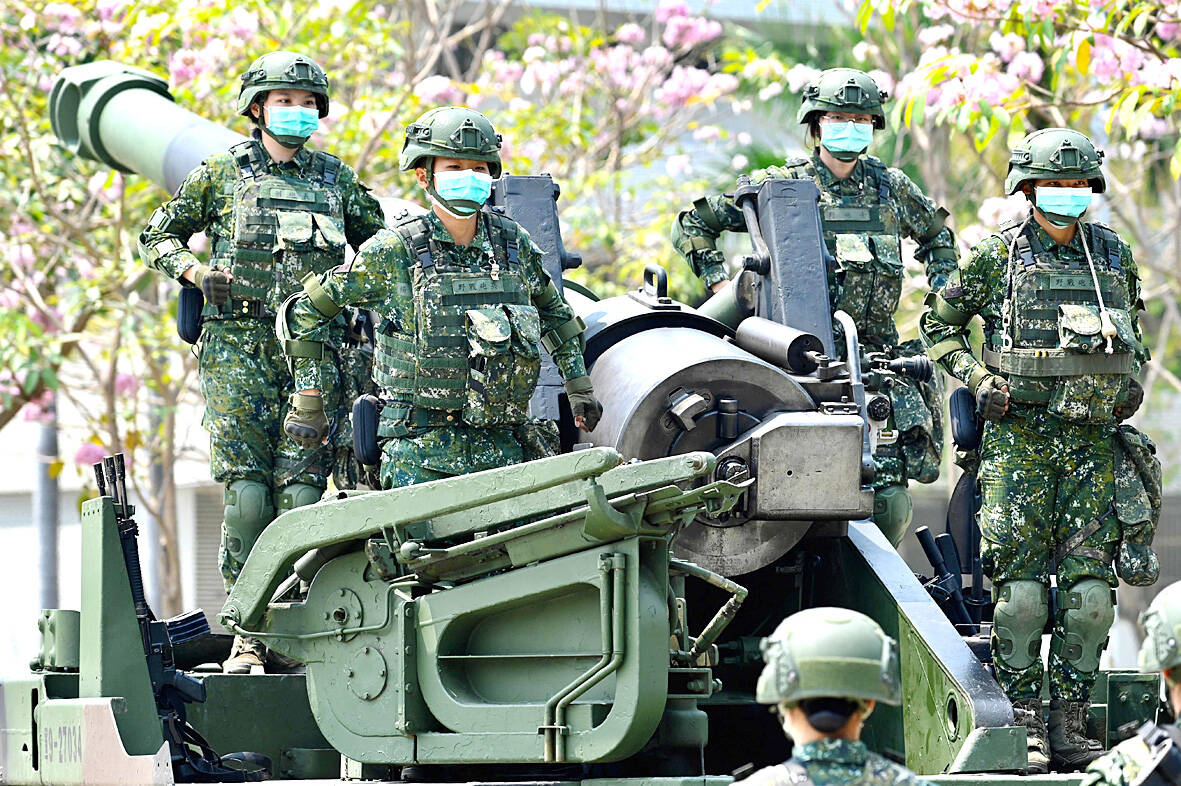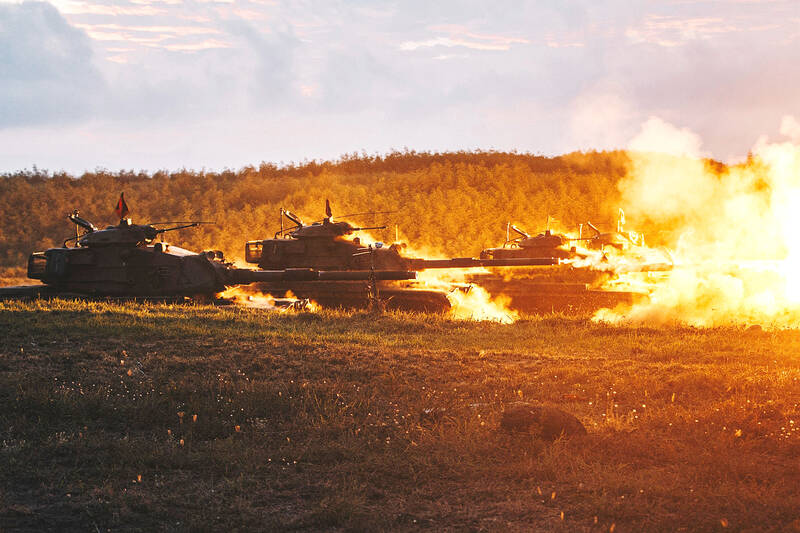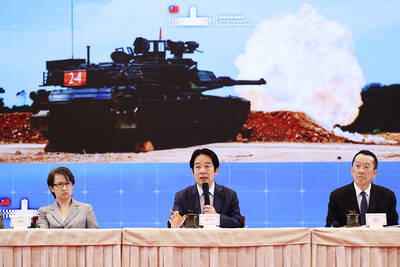Word has it that the US Congress’ bold move last week on Taiwan, the Taiwan Policy Act (TPA), is going to be an earthquake for Taiwan policy. The bill calls for arms worth US$4.5 billion, along with a US$2 billion loan program for weapons purchases, permission to change the name of the US representative office, making the head of the US office here equal to an ambassador requiring confirmation by the Senate and designation of Taiwan a major non-NATO ally.
It alters the wording of the 1979 Taiwan Relations Act (TRA), which encourages the US to provide arms of a defensive nature for Taiwan, to arms to “deny and deter acts of aggression.” It also specifies sanctions for China if it attacks Taiwan. Finally, the bill establishes a “regional contingency stockpile” to ensure that Taiwan has the defensive weapons, protective gear and medical supplies on-island in case of Chinese attack.
BIPARTISAN SUPPORT

Photo: AP
Alas, as we moved toward the end of last week, the administration of US President Joe Biden was actively attempting to get Congress to water down the symbolic language of the bill. In Zhongnanhai they must be doubling over with laughter watching the administration gather up its skirts and rush into Congress to get the symbolic wordings changed, all because the Chinese made some noise.
A victory at no cost to Beijing! Chinese leaders could care less what verbiage the US uses, since it is all going to be drowned in fire at some point anyway. Getting upset about it is simply a rhetorical posture Beijing uses to shape the US debates and fire up its domestic audience.
As this bill was heading out of the Senate Foreign Relations Committee, both Republican and Democratic senators spoke strongly in favor of it. All news reports indicate that it has strong bipartisan support.

Photo: AFP
The widespread support for the bill in Congress shows how Taiwan has benefited from years of struggle by advocates in Washington to make sure that it does not become a partisan issue, with one party reflexively for and one party reflexively against, and the nation’s defense needs stalled in the US Congress as a result.
The bill has been in the works for over a year. China’s pressure on Taiwan has drawn a strong response from the US Congress. A congressional staffer posting on Twitter stated: “This bill IS, however, due to PRC provocation/its military & econ aggression against Taiwan over the past few years.”
The response to the bill also showed how the commentary on “provoking China” has reached peak weird — it is possible for commentators to argue that the symbolic aspects of the bill may convince China that the US has changed its policy on Taiwan, but US$4.5 billion in weapons plus a loan facility for weapons purchases worth another US$2 billion is just fine. Say what?

Photo: AFP
This strange dichotomy between tangible and intangible parts of an overarching policy made by commentators is not visible in China’s expansionist aggression toward Taiwan and the lands beyond. Beijing treats the tangible and intangible parts of its policies as seamless, lawfare and disinformation complementing the deployment of military assets and boosting of production at shipyards. We should do no less.
It is borderline silly to worry about renaming the US office in Taiwan when China has a sophisticated influence program aimed at all the Western democracies, and has in custody citizens of other democracies for committing the “crime” of speaking and writing about China. When it is imprisoning and starving Uighurs. When its propaganda constructions of history are regularly shoved into newspapers and academic writing as if they were reality. When its claims on others’ territories expand, and its markets remain closed to leading Western firms. When it regularly threatens to kill the people of Taiwan, including the 70,000 or so US citizens here.
How has deferring to China’s sensitive feelings ever changed any of this behavior?
How many times am I going to have to write that paragraph followed by that question?
A Financial Times piece on the bill (“US’s Taiwan security bill spurs debate on level of support for Taipei”, Demetri Sevastopulo, Sept. 13) quoted academic Bonnie Glaser as saying: “If the bill passes in its current form, we’re really in for a major crisis.”
Several other prominent commentators made similar arguments.
MAJOR CRISIS?
I got news for the people thinking that: we’re already heading for a major crisis. Failing to pass bills like this will only provoke a Chinese invasion, in the same way that failing to bring Ukraine into NATO lead inexorably to Russian President Vladimir Putin’s invasion. Indeed, the noises that Putin made about NATO had exactly the same function as the noises China makes about bills like this: to keep them from happening, thus lowering the cost of military action.
The bill’s supporters in Washington made the same point, arguing that Ukraine’s experience showed that the weapons had to be there before the conflict began. The Ukraine war has convinced many that the Chinese threat to Taiwan is real and that they should act. Thank you, Vladimir Vladimirovich, for driving a truck through years of patient work by China to blunt the West’s response to the Taiwan scenario.
Policymakers should be reminded: whatever costs the Chinese response has for Washington or Taiwan, they will still be less than the cost of a regional war. If Europe and the US had permitted Ukraine to enter NATO, they would not be spending billions in its defense, there would be no threat of famine in poorer nations, the world would not be teetering on the brink of global recession and tens of thousands of Ukrainians would still be alive.
We got the same warnings of disaster about the Pelosi visit. The Chinese took the steps they were planning to take sooner or later, and we got this bill and a world awakened to the problems we face.
Reading the comments on what Beijing might do, I was reminded of General Ulysses Grant’s comments to one of his subordinates at the Battle of the Wilderness in the US Civil War: “Oh, I am heartily tired of hearing about what Lee is going to do. Some of you always seem to think he is suddenly going to turn a double somersault, and land in our rear and on both of our flanks at the same time. Go back to your command, and try to think what we are going to do ourselves, instead of what Lee is going to do.”
Last week China’s leader Xi Jinping (習近平) and Putin met in Samarkand amidst military exercises in the northern Pacific celebrating their ‘no limits’ partnership, presumably even closer than lips and teeth.
Last week too Chinese vessels at Philippines’ Scarborough Shoal (Huangyan Island, 黃岩島) drove off another attempt at resupplying the sailors of the rusting Philippines’ ship.
These developments show that the TPA cannot stand alone. The US also needs Congress to move forward with a major expansion of US shipbuilding capacity and a shipbuilding program resembling the Two-Ocean Navy Act of 1940. Weapons for Taiwan are great, but they have to be supported and augmented by US capabilities.
Time to fire up those production lines, Washington. Think the war in Ukraine is consuming munitions? Wait until you all see what a war with Beijing will demand.
Notes from Central Taiwan is a column written by long-term resident Michael Turton, who provides incisive commentary informed by three decades of living in and writing about his adoptive country. The views expressed here are his own.

For many centuries from the medieval to the early modern era, the island port of Hirado on the northwestern tip of Kyushu in Japan was the epicenter of piracy in East Asia. From bases in Hirado the notorious wokou (倭寇) terrorized Korea and China. They raided coastal towns, carrying off people into slavery and looting everything from grain to porcelain to bells in Buddhist temples. Kyushu itself operated a thriving trade with China in sulfur, a necessary ingredient of the gunpowder that powered militaries from Europe to Japan. Over time Hirado developed into a full service stop for pirates. Booty could

Politically charged thriller One Battle After Another won six prizes, including best picture, at the British Academy Film Awards on Sunday, building momentum ahead of Hollywood’s Academy Awards next month. Blues-steeped vampire epic Sinners and gothic horror story Frankenstein won three awards each, while Shakespearean family tragedy Hamnet won two including best British film. One Battle After Another, Paul Thomas Anderson’s explosive film about a group of revolutionaries in chaotic conflict with the state, won awards for directing, adapted screenplay, cinematography and editing, as well as for Sean Penn’s supporting performance as an obsessed military officer. “This is very overwhelming and wonderful,” Anderson

Another moment of the US making permanent concessions for transient gains, which appears to be longstanding US policy with the People’s Republic of China (PRC), occurred last week when President Donald Trump announced that weapons sales to Taiwan would be delayed in order to arrange a meeting with the PRC dictator Xi Jinping (習近平). There were “concerns among some in the Trump administration that greenlighting the weapons deal would derail Trump’s coming visit to Beijing, according to US officials,” the Wall Street Journal reported. It attributed the suspension of the weapons sale to pressure from Xi. While some might shrug

Jacques Poissant’s suffering stopped the day he asked his daughter if it would be “cowardly to ask to be helped to die.” The retired Canadian insurance adviser was 93, and “was wasting away” after a long battle with prostate cancer. “He no longer had any zest for life,” Josee Poissant said. Last year her mother made the same choice at 96 when she realized she would not be getting out of hospital. She died surrounded by her children and their partners listening to the music she loved. “She was at peace. She sang until she went to sleep.” Josee Poissant remembers it as a beautiful